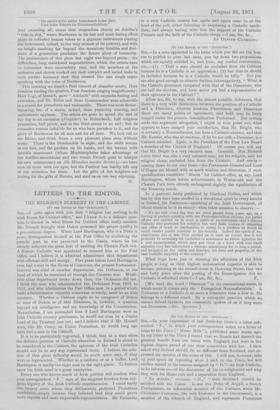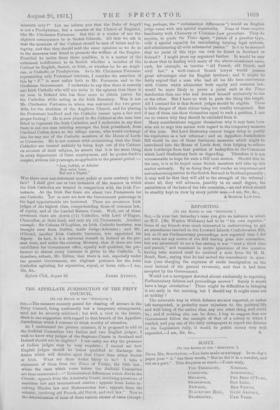roe are EOLFOR OF THE "SPETATOIl."3 Sift,—IR your impression of
last Saturday there is a letter sub-
scribed F.," in which your correspondent refers to a letter of mine to the Tims (" Home Rule "), published some weeks ago. In my letter to the Times i stated that we Scotch had derived the greatest benefit from our union with Euglatid, and were in the highest degree proud of our close connection with her. I then asked why Ireland should be eo different from Scotland, and ex- pressed my opinion of the cause of this. I will not, however, take up your space by repeating what I said in the Times, but will confine myself to the reasons assigned by " D."—an Irish Catholic, as he informs us—of the discontent of his Co-religionists and why they wish for Home rule and is separation from. Euglaud.
" No wonder," exclaims " D„" " that Scotland should be satisfied with the Union. is riot the Duke of Argyll, a Scotch Presbyterian, an iiilluentita 111C,■111bOr of the Cabinet, while Mr. Chichester Forteecue, the only lmlshesta in the Governmedt, is a member of the Church of Eugland, and represents Protestant interests only ?" but me inform you that the Duke of Argyll is not a Presbyterian, but a member of the Church of England, like Mr. Chichester Fortescue. But this is a matter of not the slightest consequence to us Scotch Liberals. All that we ask is that the members of the Cabinet should be men of talent and in- tegrity, and that they should hold the same opinions as we do as to the measures best fitted to promote the welfare of the Empire. Provided he unites those three qualities, it is a matter of the extremest indifference to us Scotch whether a member of the Cabinet be English, Scotch, or Irish, or whether he be an Angli- can, or Catholic, or Presbyterian. As to Mr. Chichester Fortescue representing only Protestant interests, I consider the assertion of this by " F." is most unfair both to Mr. Fortescue and to the Gladstone Government. I undertake to say that there is scarcely one Irish Catholic who will not unite in the opinion that there is no man in Ireland who has done more to obtain justice for the Catholics while acting as the Irish Secretary. Was it not Mr. Chichester Fortescue to whom was entrusted the two great Bills, for the abolition of the Anglican Church, and for placing the Protestant landlord and the Catholic tenant upon a fair and proper footing ? He is now placed in the Cabinet as the man best fitted to represent the Irish Catholics, and I undertake to say that there is not one man existing amongst the Irish priesthood, from Cardinal Callen,down to the village curate, who would exchange him for any ono of the Catholic members of the House of Lords or Commons. He is not content with maintaining that the Irish Catholics are treated unfairly by being kept out of the Cabinet on account of their religion, he asserts that it is the same thing in every department of State employment, and he quotes Swift's couplet, written 15(,) years ago, as applicable to the present period
"Jew, Infidel, or Atheist
May enter here, But not a Papist."
Was there ever any statement more unfair or more contrary to the fact? I shall give one or two instances of the manner in which the Irish Catholics are treated in comparison with the Irish Pro- testants. At the Irish Bar there are about two Protestants for one Catholic. 'Let us now see how the Government patronage in the legal appointments are bestowed. There are seventeen Irish judges of the highest class, comprehending those of common law, of equity, and of the Landed Estates Court. Well, out of those seventeen there are eleven (11) Catholics, with Lord O'Hagan, Chancellor, at their head, and only six (6) Protestants. Another example Sir Colman O'Leghlen, an Irish Catholic barrister, was brought over from Dublin, made Judge-Advocate ; and Mr. O'Dowd, another Irish Catholic barrister, was appointed his deputy. In tact, it is a universal remark in Ireland at tho pre- sent time, and under the existing Ministry, that if there are two candidates for Government office, equally well qualified, the pre- ference in almost every instance is given to the Catholic. I, therefore, submit, Mr. Editor, that there is not, especially under the present Government, the slightest pretence for the Irish Catholics agitating for separation, repeal, or home rule.-1 am, Sir, &c.,































 Previous page
Previous page